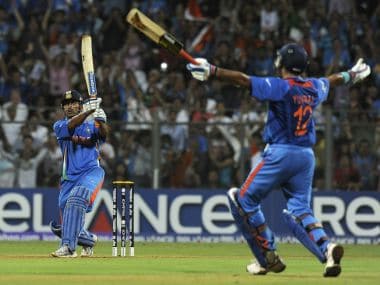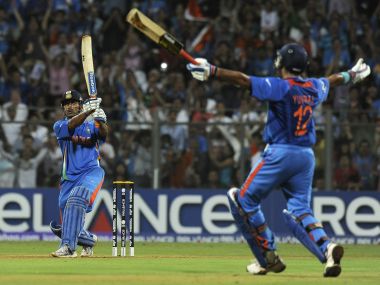The buzz started sometime in 2010. Even as the euphoria generated during the Commonwealth Games — held in New Delhi — began to subside, the humming anticipation of an approaching storm refused to die. Call it India’s record-breaking medal haul at the Games or the intrepid tour to South Africa in the winter, the stars, one believes in hindsight, were beginning to align well before Virender Sehwag dispatched the first ball of the 2011 World Cup to boundary. The 2007 edition of World Cup was a disaster. Not since Mohammed Azharuddin confessed to have fixed matches had Indian cricket found itself on such accident-prone crossroads. The images were telling. Not always do you see Rahul Dravid struggling to hold back tears, or Sachin Tendulkar staring glumly into the horizon, or Sourav Ganguly out of wits. In a land known for its wild parties, Indians were dead men walking: lonely, lost and limp. [caption id=“attachment_4414485” align=“alignleft” width=“380”] Indian captain Mahendra Singh Dhoni (L) hits a six to win the 2011 World Cup against Sri Lanka at the Wankhede Stadium in Mumbai on 2 April , 2011. AFP[/caption] By the time 2011 arrived, two of Indian cricket’s famous batting trinity had retired. Coach Greg Chappell was shown the door, and the long-haired sensation, who had surprised the world by winning the World Twenty20 (T20) crown in South Africa just months after the ignominious exit from the 50-over event in the Caribbean, was in his fourth year as India’s limited-overs’ captain. Years later, Tendulkar would confess of contemplating retirement after the forgettable 2007 World Cup, only to be reminded by his brother that the next edition of the quadrennial event would be in India, with its final scheduled in Mumbai, the city of his birth. The stars were surely aligning — what choice did they have anyway? The greatest cricketer of his generation ending his career without a World Cup medal would have been a travesty of tragic proportions, and Yuvraj Singh took it upon himself to avert the grave injustice. Match after match, innings after innings, the strapping cricketer from Punjab turned up, coughing blood, puking blood, and playing with the bloody-minded resolve of a cold-blooded executioner. Except, Yuvraj showed more passion than a cold-blooded executioner. His guttural cry after stroking the boundary that won India the quarter-final against Australia in Ahmedabad was more a call to arms than the exhalation of relief and joy. Beneath that volley of expletives, underneath the clots of blood he spat, lay the knowledge of winning big moments. All the thrill of winning the Under-19 World Cup, having an ODI debut befitting a rock star, and lifting the World T20 in 2007, all the experience accumulated over a career that had made him one of India’s most gifted batsmen, all the barbs he had copped in unmentionable Punjabi, all the abuse he had endured from his punishing father who had brutally murdered his skating aspirations for cricket came to fruition on that unforgettable night at the Wankhede. There he stood, his arms afloat, his throat hoarse with mad cries, as he saw Dhoni launching Nuwan Kulasekara over long-on. A nation that had heaved all night found its release, and Dhoni secured his place in the cricketing history with an innings of lifetime. Back in 1986, a bemused Graham Gooch had asked Ian Botham, who, upon returning from serving a ban over use of marijuana had taken a wicket on his first ball: “Who is writing your script?” It would not be out of place to pose that query to Dhoni. A delayed call-up to national team, a forgettable debut, a captaincy offer out of nowhere, a World Cup in his maiden outing, an IPL legend, and purveyor of nation’s biggest drug, it really could have been no one else to hit the runs that ended India’s 28-year wait for the trophy. Tendulkar, the second-highest scorer at the event, was carried around Wankhede by his teammates. From a ball boy who had seen the end of India’s World Cup campaign in 1987 to a wonder kid who grew up in front of a nation of a billion-plus, instantly becoming the sole source of alleviating them from the yoke of their being — their mediocre Indianness — Tendulkar deserved no less a farewell. Sitting on the tough shoulders of Yusuf Pathan — perhaps the only contribution of note from him in the entire event— Tendulkar, draped in tri-colour and not bothering to fight tears, waved at the nation in gratitude, who shouted back in servile deference. It was a strange night. Everyone hugged everyone, everyone greeted everyone, everyone treated everyone. It was a night when the policemen in New Delhi gyrated with the rowdy dudes they would otherwise chase away, when slum-dwellers crept out of their hellholes and danced on the elitist streets of the national capital like noone is watching. Nobody cared; it was that kind of night, one where world lay at our feet. Seven years hence, looking back at India’s road to the Cup assumes importance of academic absurdity, for numbers do scant justice to the national euphoria that then bubbled over. Vignettes remain: of Sehwag boorishly calling Bangladesh an ordinary side and then walking the talk with a thunderous 175, of Tendulkar depositing Graeme Swann and Dale Steyn deep in the crowd, of Yuvraj Singh doing what he did, and of Dhoni staring at the ball he had sent in the Mumbai skyline, holding the pose for posterity. Vignettes also remain of a diminutive left-hander who, in his soiled shirt and with his trademark pugnacity, did the dirty laundry. To forget Gautam Gambhir’s 97 in the final would be grossly unfair, and it’s time due credit is given to the innings that set the foundation for India’s win. India would lift the Champions Trophy two years later, find a new captain, a new coach, scale the Test summit, but something about that night remains unfathomable, something that makes it impossibly unforgettable. Speaking to camera, a 21-year-old tyro summed up the national emotion in 21 eloquent words. “He carried the burden of the nation for 21 years, so it is the time we carried him on our shoulders,” said Virat Kohli. It was that kind of night.
Indian captain Mahendra Singh Dhoni (L) hits a six to win the 2011 World Cup against Sri Lanka at the Wankhede Stadium in Mumbai on 2 April , 2011. AFP[/caption] By the time 2011 arrived, two of Indian cricket’s famous batting trinity had retired. Coach Greg Chappell was shown the door, and the long-haired sensation, who had surprised the world by winning the World Twenty20 (T20) crown in South Africa just months after the ignominious exit from the 50-over event in the Caribbean, was in his fourth year as India’s limited-overs’ captain. Years later, Tendulkar would confess of contemplating retirement after the forgettable 2007 World Cup, only to be reminded by his brother that the next edition of the quadrennial event would be in India, with its final scheduled in Mumbai, the city of his birth. The stars were surely aligning — what choice did they have anyway? The greatest cricketer of his generation ending his career without a World Cup medal would have been a travesty of tragic proportions, and Yuvraj Singh took it upon himself to avert the grave injustice. Match after match, innings after innings, the strapping cricketer from Punjab turned up, coughing blood, puking blood, and playing with the bloody-minded resolve of a cold-blooded executioner. Except, Yuvraj showed more passion than a cold-blooded executioner. His guttural cry after stroking the boundary that won India the quarter-final against Australia in Ahmedabad was more a call to arms than the exhalation of relief and joy. Beneath that volley of expletives, underneath the clots of blood he spat, lay the knowledge of winning big moments. All the thrill of winning the Under-19 World Cup, having an ODI debut befitting a rock star, and lifting the World T20 in 2007, all the experience accumulated over a career that had made him one of India’s most gifted batsmen, all the barbs he had copped in unmentionable Punjabi, all the abuse he had endured from his punishing father who had brutally murdered his skating aspirations for cricket came to fruition on that unforgettable night at the Wankhede. There he stood, his arms afloat, his throat hoarse with mad cries, as he saw Dhoni launching Nuwan Kulasekara over long-on. A nation that had heaved all night found its release, and Dhoni secured his place in the cricketing history with an innings of lifetime. Back in 1986, a bemused Graham Gooch had asked Ian Botham, who, upon returning from serving a ban over use of marijuana had taken a wicket on his first ball: “Who is writing your script?” It would not be out of place to pose that query to Dhoni. A delayed call-up to national team, a forgettable debut, a captaincy offer out of nowhere, a World Cup in his maiden outing, an IPL legend, and purveyor of nation’s biggest drug, it really could have been no one else to hit the runs that ended India’s 28-year wait for the trophy. Tendulkar, the second-highest scorer at the event, was carried around Wankhede by his teammates. From a ball boy who had seen the end of India’s World Cup campaign in 1987 to a wonder kid who grew up in front of a nation of a billion-plus, instantly becoming the sole source of alleviating them from the yoke of their being — their mediocre Indianness — Tendulkar deserved no less a farewell. Sitting on the tough shoulders of Yusuf Pathan — perhaps the only contribution of note from him in the entire event— Tendulkar, draped in tri-colour and not bothering to fight tears, waved at the nation in gratitude, who shouted back in servile deference. It was a strange night. Everyone hugged everyone, everyone greeted everyone, everyone treated everyone. It was a night when the policemen in New Delhi gyrated with the rowdy dudes they would otherwise chase away, when slum-dwellers crept out of their hellholes and danced on the elitist streets of the national capital like noone is watching. Nobody cared; it was that kind of night, one where world lay at our feet. Seven years hence, looking back at India’s road to the Cup assumes importance of academic absurdity, for numbers do scant justice to the national euphoria that then bubbled over. Vignettes remain: of Sehwag boorishly calling Bangladesh an ordinary side and then walking the talk with a thunderous 175, of Tendulkar depositing Graeme Swann and Dale Steyn deep in the crowd, of Yuvraj Singh doing what he did, and of Dhoni staring at the ball he had sent in the Mumbai skyline, holding the pose for posterity. Vignettes also remain of a diminutive left-hander who, in his soiled shirt and with his trademark pugnacity, did the dirty laundry. To forget Gautam Gambhir’s 97 in the final would be grossly unfair, and it’s time due credit is given to the innings that set the foundation for India’s win. India would lift the Champions Trophy two years later, find a new captain, a new coach, scale the Test summit, but something about that night remains unfathomable, something that makes it impossibly unforgettable. Speaking to camera, a 21-year-old tyro summed up the national emotion in 21 eloquent words. “He carried the burden of the nation for 21 years, so it is the time we carried him on our shoulders,” said Virat Kohli. It was that kind of night.
Looking back at 2 April, 2011: A one-of-a-kind night when India rejoiced with the world at their feet
Shantanu Srivastava
• April 2, 2018, 11:16:08 IST
A nation that had heaved all night found its release, and Dhoni secured his place in the cricketing history with an innings of lifetime.
Advertisement
)
End of Article